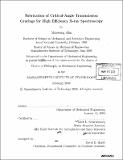| dc.contributor.advisor | Mark L. Schattenburg. | en_US |
| dc.contributor.author | Ahn, Minseung | en_US |
| dc.contributor.other | Massachusetts Institute of Technology. Dept. of Mechanical Engineering. | en_US |
| dc.date.accessioned | 2009-08-26T17:07:14Z | |
| dc.date.available | 2009-08-26T17:07:14Z | |
| dc.date.copyright | 2009 | en_US |
| dc.date.issued | 2009 | en_US |
| dc.identifier.uri | http://hdl.handle.net/1721.1/46625 | |
| dc.description | Thesis (Ph. D.)--Massachusetts Institute of Technology, Dept. of Mechanical Engineering, 2009. | en_US |
| dc.description | Includes bibliographical references (p. 169-181). | en_US |
| dc.description.abstract | Diffraction gratings are fundamental optical elements that separate incident light into its constituent wavelength components. This dispersive feature of diffraction gratings has been broadly utilized in many applications including spectroscopy, microscopy, and interferometry. As high-energy electromagnetic waves, such as extreme ultraviolet (EUV) and x rays, are of interest in various science fields including astrophysics, fine pitch gratings with high diffraction efficiency are required. The critical angle transmission (CAT) grating has been devised to enhance diffraction efficiency of a transmission grating via reflection from the grating sidewalls. The shallow critical angle (1 - 2°) for total external reflection of incident x rays defines the geometry of the CAT grating and a consequent blazing condition. However, the geometrical requirements for the mirror-like grating bars with a very high aspect ratio are challenging to fabricate. The work presented in this thesis is about how to produce the CAT gratings by integrating many micro and nano-fabrication technologies. The fabrication process involves interference lithography for patterning fine pitch gratings and wet anisotropic etching on thin silicon membranes for straight and ultrahigh aspectratio (~ 150) freestanding structures. Potassium hydroxide (KOH) etching of the nanostructure is extensively investigated to improve etch anisotropy, uniformity, and process latitude. A stress-induced grating stiction problem during wet hydrofluoric acid (HF) release is analyzed using finite element modeling (FEM) of a thin grating plane between support structures on top of oxide in compressive stress. I successfully fabricated the CAT gratings with 574 and 200 nm periods, which were tested with synchrotron x rays with wavelengths ranging from 1 to 50 nm. The x-ray diffraction measurement showed the strong blazing effect in a non-zero diffraction order and the normalized diffraction efficiency was consistent with prediction by theory within 70- 85%. | en_US |
| dc.description.statementofresponsibility | by Minseung Ahn. | en_US |
| dc.format.extent | 181 p. | en_US |
| dc.language.iso | eng | en_US |
| dc.publisher | Massachusetts Institute of Technology | en_US |
| dc.rights | M.I.T. theses are protected by
copyright. They may be viewed from this source for any purpose, but
reproduction or distribution in any format is prohibited without written
permission. See provided URL for inquiries about permission. | en_US |
| dc.rights.uri | http://dspace.mit.edu/handle/1721.1/7582 | en_US |
| dc.subject | Mechanical Engineering. | en_US |
| dc.title | Fabrication of critical-angle transmission gratings for high efficiency x-ray spectroscopy | en_US |
| dc.type | Thesis | en_US |
| dc.description.degree | Ph.D. | en_US |
| dc.contributor.department | Massachusetts Institute of Technology. Department of Mechanical Engineering | |
| dc.identifier.oclc | 426046651 | en_US |
